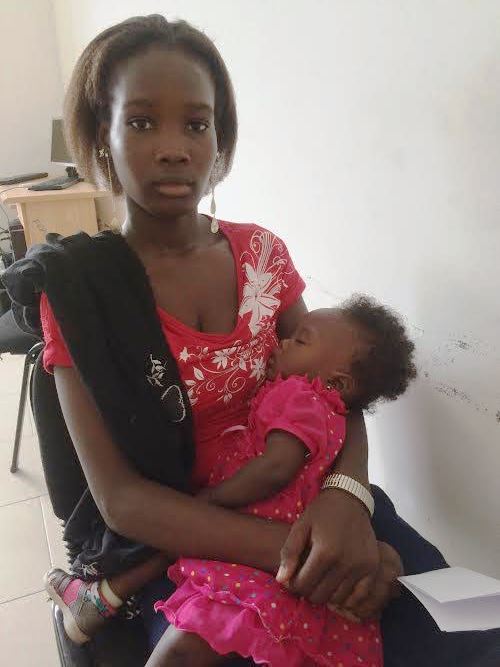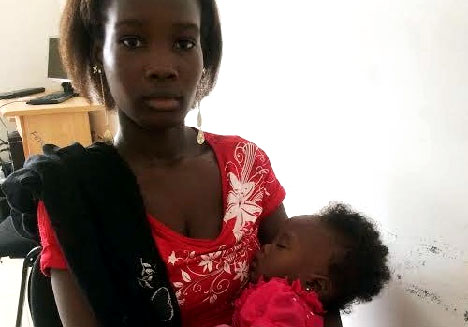The recent meeting of the World Bank Group (WBG) and International Monetary Fund (IMF) in Lima, Peru, revealed that girls in the rural part of Nigeria are married off at the average age of 17.
Zainab Hamit wished her story was any different from this ill that seems to be defining rural Nigeria and the life of a girl child. But she’s not that fortunate – her story is heartbreaking.
Zainab hails from Maiduguri, Borno state, but today resides in Port Harcourt, Rivers state, with her parents. Like many young girls of her age, she was exposed to primary education and went on to the Model Girls Secondary School till junior secondary class three (JSS 3).
After her JSS 3, her father pulled her out of school, forcing her into an early marriage at the age of 16 to a total stranger. For Zainab, love was a luxury, care was too much to ask, and compassion was nowhere to be found.
Advertisement
She became bed mates with a strange fellow, who cared less about her personal aspirations. He could barely care for himself; he clearly lacked the means to cater for a family.
Zainab resisted her father’s decision to get her married to a total stranger, but the only alternative was to kick her out of the house with no regard for her humanity.
DECEIVED INTO MARRIAGE
Her wedding ceremony “went well” to the pleasure of her father and her husband who is also from Maiduguri.
Advertisement
It was only when she got into the marriage that she discovered that her husband did not have a house but squatted in an uncompleted building. She did not know what he did for a living and alleged that many times, he would disappear from the house for weeks without leaving any money for her upkeep.
She took in for him, and was heavy with pregnancy. At this point, she pleaded with him to take her to the hospital for ante-natal care, but he turned deaf ears to her cry.
Education was gone, pregnancy was here and even the care to see that through to proper delivery was nowhere to be found. He even sold off her clothes each time he ran out of money.
She saw herself through pregnancy, and at the point of delivery, he ran away from the hospital because he could not afford N14,000 hospital bills. It took the efforts of good-hearted Nigerians to offset the bill, after which she went home to her parents to be nursed by her mother.
Advertisement

SUICIDE ATTEMPT
Not long after delivery, her father insisted that she returned to her husband’s house, where she would be forced to cater for her nascent daughter in a penniless state.
In all of these, she requested for a divorce time and again, but her husband would have none of it.
She sought comfort in her father’s house, but he declined her ‘asylum’, for which she resorted to committing suicide. She was on the verge of doing so when she was found and brought to the International Federation of Women Lawyers (FIDA) in Port Harcourt.
When TheCable sought to speak to with the husband, the lawyer in charge of the case, Obiageli Oraka, said he was unwilling to speak to the press on the matter.
Advertisement
“It was just Zainab who said she doesn’t mind her story going public, because a lot of people are going through the same thing, her elder sister went through the same thing,” Oraka told TheCable.
“These are things that people need to know and we have to fight for them to stop, they are many of them here in Port Harcourt going through the same issue. FIDA just wants to finish with this one before taking another one.”
Advertisement
DIVORCE COMPLICATIONS
Oraka, the project/legal officer with FIDA Rivers, further said her husband, who is Arab-Maidugri, was invited to the centre to relay his side of the story and agree to a possible divorce.
FIDA, with the help of Zainab’s mother, convinced her father to take her back home. Everyone involved in the story, save the father, was invited to FIDA, and they all attested to the husband’s callousness. They agreed that Zainab should never have been allowed to marry him.
Advertisement
They also agreed that divorce was the best option and begged the young man to agree to divorce her. He remained adamant until an agreement was reached to return the N80,000 pride price he paid for marrying the minor.
He then insisted on the refund of N23,000 for a wrapper he bought for her family as part of the marriage ceremony, but he was reminded that he had sold off most of Zainab’s wrappers/clothes and therefore not entitled to such refund.
Advertisement
He also insisted that he must take his child who is less than six months old, but he was cautioned to desist from such action as that would land him in jail.
The challenge, however, is how to raise money for the repayment of the bride price, considering that her family is too poor to afford this amount of money, which would facilitate the divorce.
There is also a great need to raise this money very soon before her father who is very poor and sickly could change his mind on the divorce due to his inability to repay.
There is no shelter in Port Harcourt for abused women and the centre would be facing a greater challenge of securing an accommodation for her should her father ask her to return to him due to inability to repay.
Zainab also needs to reduce the number of out-of-school children by returning to school, fulfilling her dreams and aspiration for higher education, while training her daughter in like manner.
She wants to be a lawyer, who stands up for the voiceless in society, but that will be impossible without the help of well-meaning Nigerians.







